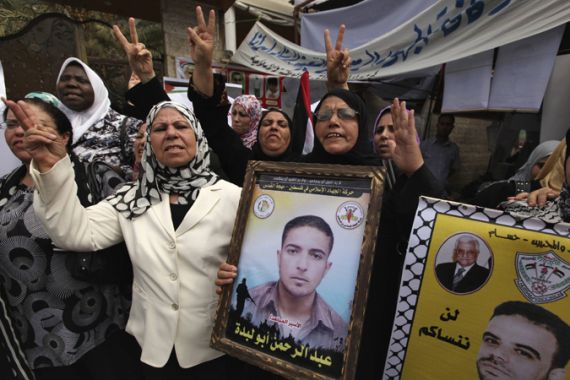Support grows for Palestinian’s prison strike
Activists start open-ended hunger strike in support of prisoners in Israel fasting against “worsening jail conditions”.

At least 60 activists in the occupied West Bank, Gaza and Israel have started an open-ended hunger strike in support of Palestinians already fasting in Israeli jails against allegedly worsening conditions.
A solidarity camp by youth was launched in the Israeli city of Haifa on Sunday in a “spontaneous response” to the detainees’ strike that was declared two weeks ago, organisers said.
“We mainly have two reasons: to support the prisoners and raise their morale [in continuing their hunger strike] and to raise awareness of the Palestinian political detainees,” Muhannad Abu-Gosh, an organiser of the Haifa camp, told Al Jazeera.
Some 50 Palestinian political prisoners began a ongoing hunger strike on September 27. Other prisoners have since joined in. As of Sunday, 234 inmates were fasting, Sivan Weizman, the spokeswoman for the Israeli Prison Service, said in a statement.
Weizman said the strikers, who are now on their 13th day of fast, are “under daily medical supervision and their situation is satisfactory”.
Voicing support
Thousands rallied last week in Haifa, Gaza City and the West Bank cities of Nablus and Ramallah against the “oppressive conditions” of Israeli prisons.
In Gaza City, hundreds rallied in support of the prisoners’ strike on Sunday and more such protests are planned.
Also on Sunday, a mother of a prisoner began a hunger strike in front of the International Committee of the Red Cross (ICRC) offices in Ramallah. Smaller gatherings and sit-ins took place in East Jerusalem.
The ICRC is the body responsible for monitoring and protecting detainees’ human rights and maintaining contact with them.
In Nablus, a tent set up on Tuesday to support the hunger strikers now recieves at least 1,500 visitors each day, Beesan Ramadan, a student at An Najah University, said.
“I’m hoping that it’ll carry on towards something more continuous in related to the prisoners’ issues in general,” Ramadan said.
Tougher restrictions
In June, Israeli Prime Minister Benjamin Netanyahu announced tougher restrictions on Palestinians’ prison rights, as part of an effort to free Gilad Shalit, an Israeli soldier held captive by Hamas.
Shalit was seized outside the Gaza Strip in 2006. Hamas, the ruling power of the coastal territory, is seeking the release of more than 1,000 Palestinian prisoners in return for his freedom.
Rights groups said the clampdown included preventing access to books, educational programmes and new clothing. It also expanded the use of solitary confinement, reduced family visits and forced detainees to meet their lawyers with their hands cuffed.
According to a March 2011 United Nations report, about 6,000 Palestinians are currently in 22 prisons in Israel and the West Bank.
Some have been denied contact with the outside world, including their families, for as long as five years, the report said.